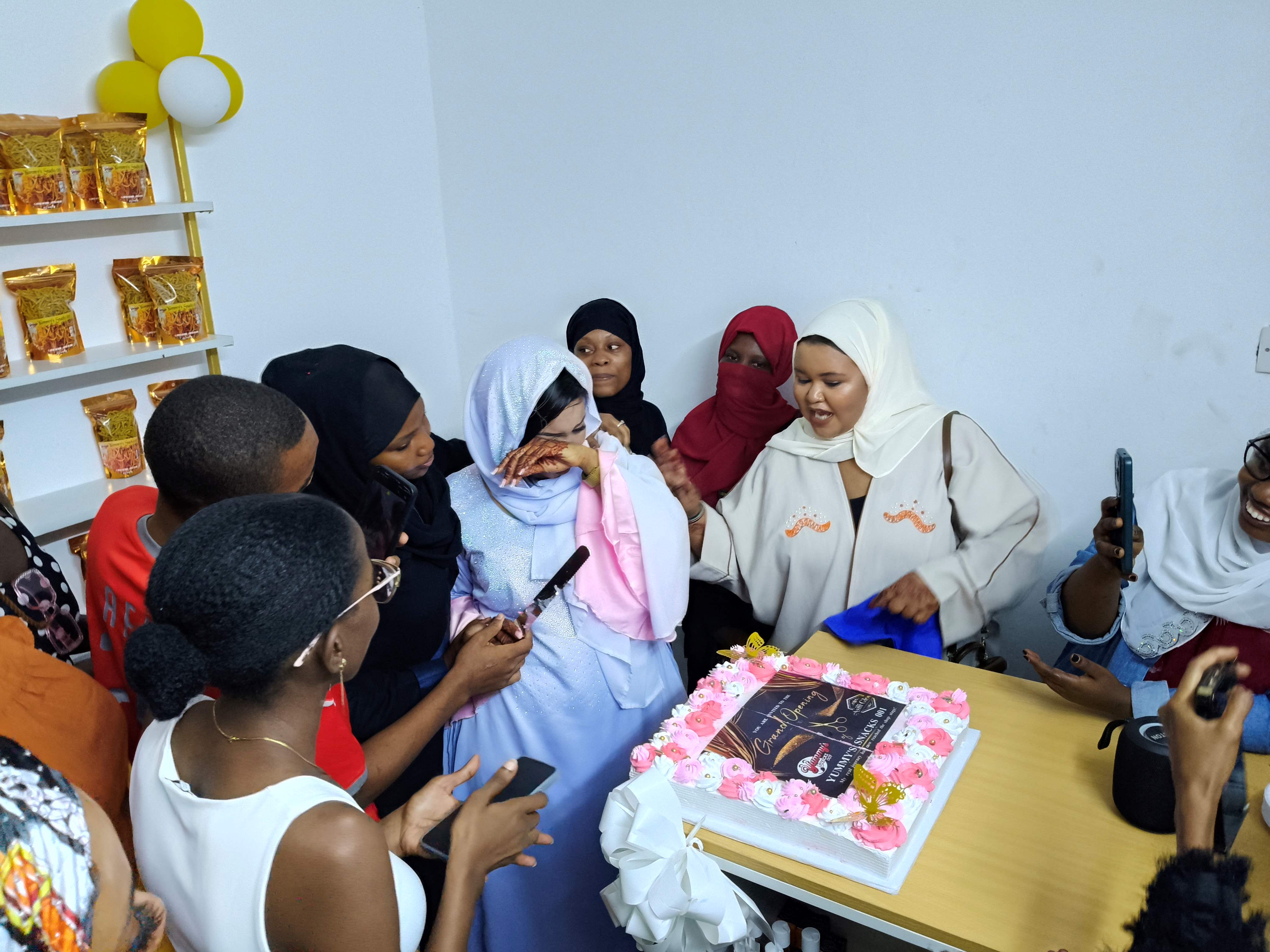
Khadija Hussein is
overwhelmed with emotions during the cake-cutting celebration on Saturday / BRIAN OTIENO
After 10 years of employment with no promotion or salary raise despite being the company’s go-to person, Khadija Hussein took a risk.
She quit the job to start her own business, a business she knew nothing about, only that “it could not be that hard, or could it”?
She had no savings because the pay from her employment was barely enough for subsistence.
“Sometimes I had to borrow fare to go to work,” the Form 4 leaver said.
In 2021, Khadija started making mabuyu (baobab fruits) from the comfort of her one-room rented house and selling them to residents, mostly neighbours.
Her dream was to make what people thought was an ordinary business for people with nothing else to do, and turn it in to an international enterprise.
However, the journey has not been easy.
She marketed her products to anyone who cared to listen.
Khadija used TikTok to market her products.
She also attended food bazaars and other social events, even uninvited, to sell her mabuyu.
“I believed that one day I will look back and appreciate my effort. I felt being employed would not bring out the best in me. And having felt unappreciated, I thought I should put the effort my own business,” ,” Khadija, popularly known as Mama Achari, said.
Achari is a snack made from dried mangoes, popular among the Swahili at the Coast.
Armed with Sh200, she bought 1kg of raw mabuyu, 1kg of sugar, food colour, and packaging nylons.
“I made the mabuyu, packed it in small packets, and started selling them at Sh10 a packet in the neighbourhood,” Khadija said.
Naysayers tried to discouraged her, saying her mabuyu were not tasty.
“But I used that as motivation and every time I strived to improve on the quality to the standards they demanded. It was fuel to my fire. Eventually, I was able to make tasty mabuyu, which was appreciated by all,” she said.
She used to make a profit of between Sh300 and Sh400 on average daily.
With her business growing, she gradually increased the amounts she produced, eventually diversifying her products to include other Swahili snacks including achari, labania, tambi, kashata and chauro (chevda), making profits of between Sh3,000 and Sh4,000 daily.
Chevda, an Indian snack, was rarely found in the estates, as they were only in supermarkets.
“So, I decided I would learn how to make chauro and make it easily available in the streets and in the villages and estates,” Khadija said.
She started selling them at Sh10, just like mabuyu, and made progress as it was accepted. Now she sells it at Sh200 per packet.
Some of the products are exported to the UK, US, Australia, through DHL.
“I want our products known worldwide,” she said.
Khadija urged her fellow youth to just start and not think about many things when they decide to do business.
“Work hard to build your business on your own and don’t depend on other sources. If you build yourself first, support will come naturally,” she said.
Khadija said she is still eager to learn more on business, finance and bookkeeping, calling on the Kenya National Chambers of Commerce and Industry for support.
“Support need not necessarily be financial only. Training could be helpful to any businessperson, especially entrepreneurs like me,” she said.
On Saturday, Khadija opened her own store in Junda, Kisauni subcounty, where she looks to expand her footprint.
KNCCI Mombasa chapter chairman Aboud Jamal said Khadija’s Yummy Snacks 001 is a success story, which the chamber is proud of.
Jamal, who has supported Khadija through her journey, said micro, small and medium enterprises are a sure way of solving the unemployment crisis in Kenya.
He said youth need not be dependent on white collar jobs only.
He said entrepreneurs are the job creators and they should be supported.
“We need to look at different ways of supporting our MSMEs not only financially but also in other ways like mentorship and training,” Jamal said.
He said the economies of most countries in the world are supported by entrepreneurs and not employees.

KNCCI Mombasa
Chapter chairman Aboud Jamal and Khadija Hussein in Junda on Saturday /BRIAN
OTIENO











